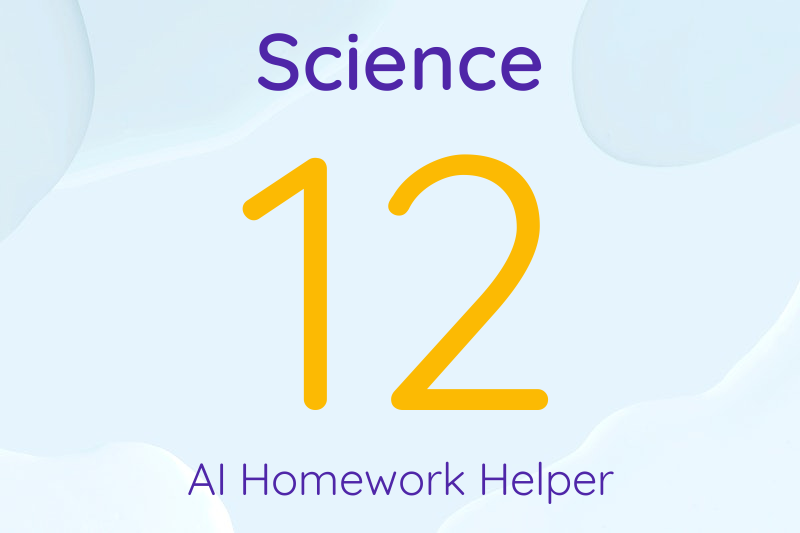Grade 12 – Science
AI Homework Helper
AI Project Helper
-
AI Homework Helper for Grade 12 – Science
AI homework helper for grade 12 Science. Instantly get help with your grade 12 Science homework whenever you need it.Ask Your XTutor About Your Grade 12 – Science Homework

Grade 12 – Science Skills
- Understanding scientific concepts and principles
- Applying scientific methods and processes
- Interpreting and analyzing scientific data
- Using scientific terminology accurately
- Conducting scientific investigations and experiments
- Applying mathematical skills to scientific problems
- Using technology and scientific tools effectively
- Understanding and evaluating scientific theories and models
- Applying critical thinking and problem-solving skills
- Communicating scientific ideas and findings effectively
- Understanding the ethical implications of scientific research
- Understanding the impact of science on society and the environment
- Collaborating and working effectively in a scientific team
- Managing time and resources efficiently
- Developing a curiosity and passion for scientific inquiry
Grade 12 – Science Curriculum
Grade 12 Science Curriculum: A Comprehensive Overview
Grade 12 Science is an essential part of the high school curriculum, providing students with a solid foundation in scientific principles and preparing them for further studies in various scientific disciplines. This article aims to provide a comprehensive overview of the topics taught in grade 12 Science, covering subjects such as Physics, Chemistry, and Biology.
Physics
Physics in grade 12 focuses on advanced concepts and theories, building upon the knowledge gained in previous years. The key topics covered include:
1. Mechanics
Students delve deeper into the study of motion, forces, and energy. They explore concepts such as Newton’s laws of motion, work and energy, momentum, and circular motion.
2. Waves and Optics
This section covers the properties and behavior of waves, including light and sound waves. Students learn about wave interference, diffraction, polarization, and the principles of optics.
3. Electricity and Magnetism
Students explore the fundamental principles of electricity and magnetism, including electric circuits, electromagnetic induction, and the behavior of electric and magnetic fields.
4. Modern Physics
This topic introduces students to the fascinating world of modern physics, including quantum mechanics, atomic and nuclear physics, and the theory of relativity.
Chemistry
The grade 12 Chemistry curriculum focuses on deepening students’ understanding of chemical reactions, atomic structure, and the periodic table. The main topics covered are:
1. Chemical Kinetics and Equilibrium
Students learn about the rates of chemical reactions, factors affecting reaction rates, and the concept of chemical equilibrium. They also explore Le Chatelier’s principle and equilibrium constants.
2. Acids, Bases, and Salts
This section covers the properties and behavior of acids, bases, and salts. Students study pH, acid-base titrations, buffer solutions, and the principles of acid-base reactions.
3. Organic Chemistry
Students are introduced to the fascinating world of organic chemistry, including the structure, properties, and reactions of organic compounds. They learn about hydrocarbons, functional groups, and organic synthesis.
4. Electrochemistry
This topic explores the relationship between electricity and chemical reactions. Students study electrochemical cells, redox reactions, and the principles of electrolysis.
Biology
The grade 12 Biology curriculum focuses on advanced biological concepts, including genetics, evolution, and human physiology. The main topics covered are:
1. Molecular Genetics
Students delve into the study of DNA, RNA, and protein synthesis. They learn about genetic mutations, gene regulation, and the principles of biotechnology.
2. Evolution and Biodiversity
This section covers the theory of evolution, natural selection, and the mechanisms of speciation. Students explore the diversity of life on Earth and the impact of human activities on ecosystems.
3. Human Anatomy and Physiology
Students study the structure and function of the human body systems, including the circulatory, respiratory, digestive, and nervous systems. They also learn about homeostasis and the interdependence of body systems.
4. Ecology
This topic focuses on the study of ecosystems, including population dynamics, community interactions, and the principles of conservation biology. Students explore the impact of human activities on the environment and sustainable practices.
Grade 12 Science provides students with a solid scientific foundation and prepares them for further studies in various scientific fields. By covering topics in Physics, Chemistry, and Biology, students gain a well-rounded understanding of the natural world and develop critical thinking and problem-solving skills that are essential for future scientific endeavors.
-
Project Helper for Grade 12 – Science Project-Based Learning (PBL)
Welcome to your very own Grade 12 – Science project hub. Project-Based Learning (PBL) is a fun and engaging way to learn new things. It’s not just about listening to a teacher talk, but about exploring topics that interest you and creating projects that show what you’ve learned.Ask Your XTutor
Step 1: UNDERSTAND THE LEARNING GOALS
Your teacher will explain what you’re going to learn from the project. These goals will be connected to what you’re supposed to learn in your grade level.
You can also read about the curriculum and skills for Grade 12 – Science on the homework helper tab.Step 2: GET CURIOUS ABOUT A QUESTION
During the second stage of the project you will choose a big, interesting question that your project will help answer. This question is meant to get you thinking and asking more questions. We have included 10 projects ideas as a starting point. You can discuss these ideas with your teacher as well as your XTutor before you decide on a final question.
Project Topics and Driving Questions to Start From:
1. Investigating Genetic Engineering: Research the field of genetic engineering and its applications. Design a project that explores gene editing techniques like CRISPR, genetically modified organisms (GMOs), or personalized medicine. Present real-world examples and discuss the potential benefits and ethical considerations of genetic engineering.
2. Investigating Climate Change Impacts: Conduct an in-depth study on the impacts of climate change on ecosystems, human health, or socio-economic factors. Analyze data, create models, or carry out field observations to understand and predict climate change effects. Present your findings and propose adaptation or mitigation strategies.
3. Bioinformatics Analysis: Explore the field of bioinformatics by analyzing genomic data or protein sequences. Use software tools to conduct sequence alignments, phylogenetic analyses, or identify genetic variants. Present your analysis and discuss the implications for evolutionary biology or medical research.
4. Investigating Quantum Mechanics: Research the principles and applications of quantum mechanics. Design experiments or simulations to explore topics like wave-particle duality, quantum entanglement, or quantum computing. Present your findings and discuss the revolutionary aspects of quantum mechanics.
5. Investigating Astrobiology: Explore the field of astrobiology, studying the origin, evolution, and potential for life on other planets. Design a project that examines extremophiles, investigates the conditions for habitability, or explores the search for extraterrestrial life. Present your findings and discuss the implications for our understanding of life in the universe.
6. Investigating Molecular Medicine: Explore the intersection of biology and medicine by researching topics like personalized medicine, targeted drug delivery, or gene therapies. Create a project that explains the molecular mechanisms involved, ethical considerations, and potential applications in healthcare. Present your findings and engage in discussions about the future of molecular medicine.
7. Investigating Biotechnology Innovations: Research cutting-edge biotechnology innovations, such as synthetic biology, gene editing, or tissue engineering. Design a project that highlights the scientific breakthroughs, challenges, and potential implications of these technologies. Present real-world examples and explore the ethical considerations.
8. Investigating Particle Physics: Dive into the realm of particle physics by studying topics like the Standard Model, particle interactions, or the Higgs boson. Design experiments or simulations to explore particle properties or carry out data analysis of particle collisions. Present your findings and discuss the latest developments in the field.
9. Investigating Neuroplasticity: Research the concept of neuroplasticity and its implications for brain development, learning, and rehabilitation. Design experiments or simulations to study neuroplasticity processes or explore techniques like brain-computer interfaces. Present your findings and discuss the potential applications in neuroscience and rehabilitation.
10. Investigating Synthetic Materials: Research synthetic materials like polymers, nanoparticles, or graphene. Design experiments or simulations to explore their properties, applications, and environmental impact. Present your findings and discuss the potential future developments of synthetic materials in various industries.
Step 3: PLAN YOUR PROJECT
With help from your XTutor or teacher, you and your classmates will plan out your project. This includes deciding what tasks need to be done, when they should be finished, and what materials you might need.
Remember: You can ask your XTutor to help you to create an action plan.
Step 4: START YOUR PROJECT
Your teacher will kick off the project, going over the big question, the project requirements, and the timeline. Then, it’s time to get started!
Step 5: LEARN AND EXPLORE
You and your classmates will work together to research the big question and learn new things. Your teacher will help guide you, but you’ll have a lot of control over where your learning goes.
Remember: Your XTutor is always here to help guide you with any questions or difficulties you might have.
Step 6: CHECK YOUR PROGRESS
Your teacher will check in with you regularly to see how you’re doing, give you feedback, and help you if you’re stuck. It’s important to make sure you stay on schedule and on task.
Step 7: SHOW WHAT YOU KNOW
Throughout the project, you’ll show your teacher what you’re learning through smaller assignments. At the end, you’ll complete a final project or test to show everything you’ve learned. You and your classmates can also create quick presentations to showcase the knowledge you have gained as well small quizzes to test each other’s understanding of the topic.
Step 8: SHARE YOUR WORK
Once your project is finished, you’ll share it with your classmates, your school, or even your community. This could be a presentation, a demonstration, or a showcase of your work.
Step 9: REFLECT ON YOUR LEARNING
After the project, you’ll think about what you learned, what you liked, what was hard, and how you can use your new knowledge in the future.
Step 10: REVIEW THE PROJECT
Finally, you’ll think about the project as a whole. What worked well? What didn’t? How can you do better on the next project? This will help you do even better on your next PBL project.


